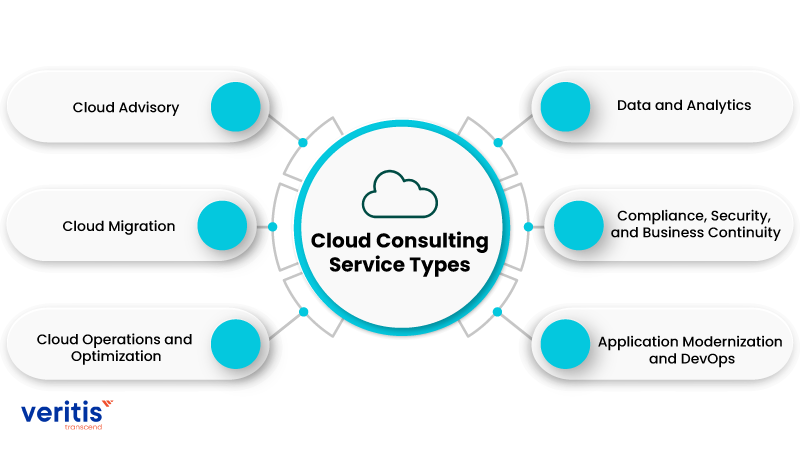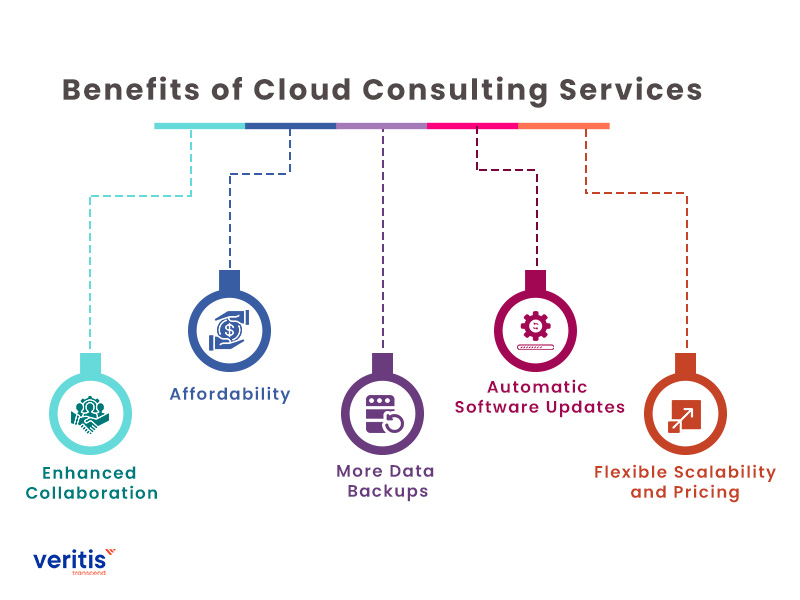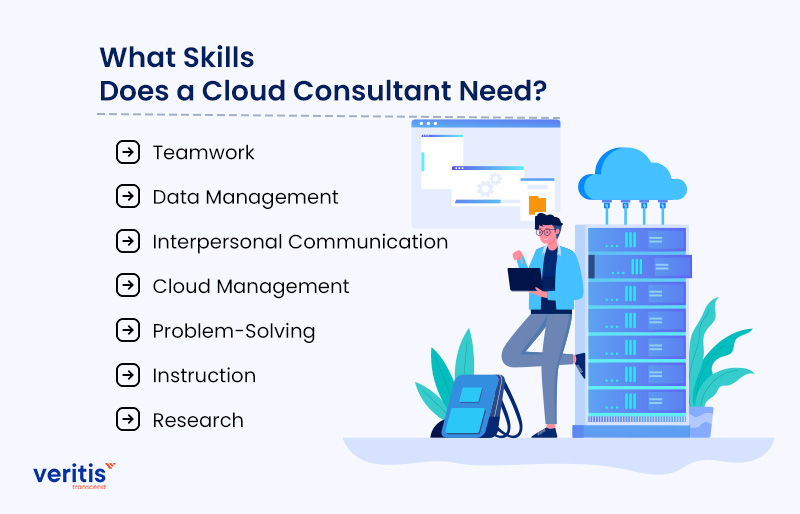Table of contents
- What is a Cloud Consultant?
- What are the Roles of a Cloud Consultant?
- Cloud Consulting Service Types
- What do You Get from Cloud Consulting?
- What are the Benefits of Cloud Consulting Services?
- Where do Cloud Consultants Work?
- What Education Does a Cloud Consultant Need?
- What Skills Does a Cloud Consultant Need?
- Optimizing Cloud Migration and Security Consulting
- How to Choose Your Cloud Consulting Option?
- Why Choose Veritis?
What is a Cloud Consultant?
Cloud consultants educate businesses on the available cloud computing services and assist them in making decisions that will improve operations. Cloud consultants have the extensive technical knowledge and play important communication roles in cloud based solutions. In addition, they are responsible for explaining cloud computing services’ advantages to specific firms in terms that non-technical company representatives may comprehend.
The cloud is positioned to lead future technologies and significantly impact current ones. It will undoubtedly exist in practically all businesses in a few years. Cloud computing refers to having constant, simple access to the network that connects servers, applications, networks, services, and other resources.
In contrast to traditional IT hosting, organizations using the cloud choose a third-party provider for software installation, processes, and other IT services. Therefore, it makes sense that cloud consultants play a significant and fruitful role. A cloud consultant primarily has knowledge of cloud-based systems and the necessary expertise to advise clients on application design, development, and infrastructure.
What are the Roles of a Cloud Consultant?

Cloud consultants will always have numerous roles to perform, depending on the organization’s goals and needs. For example, they may be security experts, database consultants, application developers, or architecture specialists. To provide clients with effective cloud computing consulting services, a cloud consultant must possess some or all the abilities listed below.
- Excellent logical and deductive reasoning to support their suggestions regarding cloud strategy.
- Excellent communication and customer service abilities to meet client requirements.
- Excellent problem-solving skills to handle special client requirements and the capacity to offer personalized solutions.
- Ability to create a successful cloud strategy for clients.
- Ability to use one or more operating systems easily.
- Networking knowledge in practice (including TCP/IP, DNS, IP addresses, and HTTP protocols).
- Comprehensive knowledge of network security concepts, notions, and principles.
- Basic knowledge of programming language (optional).
A cloud consultant has multiple positions and functions in cloud computing. Cloud consultants can work in many different roles in cloud computing. Here are a few of the more well-liked ones:
- Cloud Operations Manager
- Cloud Software Engineer
- Cloud Infrastructure Engineer
- Cloud Support Engineer
- Cloud Security Engineer
- Cloud Solutions Architect
Learn About Cloud Computing Services
Cloud Consulting Service Types

There are various services and custom cloud solutions for different business needs, and cloud computing consulting services vary from one company to another. We have categorized cloud computing consulting services into six main groups, though cloud computing services may vary depending on your cloud consultant.
1) Cloud Advisory
Cloud advisory services can help you answer essential issues, define strategy, and manage change within your company if you consider switching to the cloud. In addition, they give unbiased guidance for various cloud modernization-related organizational, procedural, and technical concerns.
2) Cloud Migration
Many factors must be considered for a successful migration to the public cloud. A cloud migration consultant can provide a comprehensive migration strategy, whether you’re relocating a single workload or an entire data center.
3) Cloud Operations and Optimization
Your cloud environments will be optimized to operate as effectively as feasible. By delegating that duty to a cloud migration consulting company, your business can enhance the performance and profits of its cloud assets.
4) Data and Analytics
Based on the 2nd watch report of 150 companies, 57% of organizations lack the analytics expertise required to satisfy business requirements. Your organization becomes data-driven with the help of data and analytics services. A cloud consultant can assist with implementing an initial set of analytic procedures if you are starting with the cloud-using data. A cloud consultant can develop, build, or improve your analytic architecture if your company is more advanced when it comes to data.
5) Compliance, Security, and Business Continuity
Every layer of your cloud security consultant should prioritize security, yet many firms do not. Security and compliance are essential when managing a cloud infrastructure. A cloud adviser can offer monitoring services for your cloud environment around the clock, so you don’t have to.
6) Application Modernization and DevOps
A DevOps transition can help your business and team members modernize your apps. This might be as easy as providing your firm with an assessment to assist it in identifying its strengths and possibilities, or it can involve a fully managed DevOps pipeline with ongoing cultural coaching.
Useful link: Cloud Security Automation: Best Practices, Strategy, and Benefits
What do You Get from Cloud Consulting?
The top cloud consulting teams follow a tried-and-true methodology. As a result, you’re investing not just in them but also in their expertise and connections to top cloud vendors. Cloud consulting companies, however, benefit corporate growth in several ways and guide teams in switching to the cloud.
- Plan
- Design
- Business Case
- Advisory services for the management
- Process guidelines and descriptions
- Advice on knowledge transfer and cloud transformation
- Code reviews and reviews of infrastructure configuration
What are the Benefits of Cloud Consulting Services?

Although hiring a cloud consulting company may initially seem expensive, the advantages of doing so far outweigh the price in a big way. Some of the advantages include:
1) Enhanced Collaboration
By using cloud consulting services, you can more easily share resources with team members dispersed across multiple locations in your company. Even if your employees are dispersed around the globe, teamwork is made possible through cloud-based workflows and file-sharing tools.
2) Affordability
Your organization’s network maintenance expenses decrease when you use the cloud platform. A small or mid-sized enterprise may find having a fully staffed IT department expensive and unnecessary. These services can be outsourced and save you thousands of dollars annually.
3) More Data Backups
Data security is one of any company’s most crucial factors. Without an effective backup plan, recovering lost data can be challenging. Any locally saved data is lost once a system crashes or is lost. A cloud management platform is necessary to solve these issues. When you work with a proper cloud technology consultant service provider, you can be confident that your company’s data is constantly backed up on the cloud. Users can be sure that all the data will recover if their devices are lost.
4) Automatic Software Updates
All software upgrades will be handled remotely after your contract with a cloud computing service provider. As a result, employing internal IT specialists to provide maintenance and software updates is no longer necessary, saving costs.
5) Flexible Scalability and Pricing
You can pick a pay-as-you-go model for these services if you work with a flexible cloud services consulting provider. For instance, a tax accounting business knows that the first quarter of the year often increases workload. Therefore, compared to past quarters, they will require more significant assistance now. When you have a payment schedule that supports your work, you may adjust it to your needs.
Useful link: 10 Awesome Business Benefits of Cloud Computing Services
Where do Cloud Consultants Work?
Cloud consultants may do their business anywhere. For instance, you may perform on-site work for a large organization as a member of its internal IT department, assisting them in making decisions about the cloud, depending on your employer. In other instances, cloud migration consultants work for independent technology companies and are hired initially for consultations rather than for the development of cloud-based applications.
Work environments for cloud consultants could include one or more of the following locations:
- Information Technology Providers
- Technology Research Enterprises
- Independent Cloud Computing Enterprises
- Medium or Large Organizations
Your location as a cloud consultant will probably depend on the type of business you work for. You may also need to travel between a client’s office and your own if you are hired as a cloud consultant to work with specific clients.
What Skills Does a Cloud Consultant Need?

In the workplace, cloud consultant certification frequently relies on various abilities. These abilities enable them to interact with clients effectively and, when needed, develop cloud-based solutions. Cloud consultants often use the following 7 IT skills:
1) Teamwork
Collaborating effectively in an environment where an IT team develops and integrates cloud-based apps into an organization’s existing network. Cloud collaboration solutions enable your team to access, edit, and even share files outside the corporate firewall while working together on on-site and off-site documents.
2) Data Management
The ability to efficiently use all required database systems, data storage applications, and file transfer tools.
3) Interpersonal Communication
Having strong communication skills with other IT team members and client representatives.
4) Cloud Management
The ability to create and maintain cloud-based apps that meet a company’s requirements and integrate smoothly with their current network.
5) Problem-Solving
The capacity to identify and resolve issues that might adversely affect a client’s cloud-based applications.
6) Instruction
Being able to educate clients on new advancements in cloud computing and guide them in understanding the advantages of incorporating prospective new applications
7) Research
The capability of consistently looking for, identifying, and implementing custom cloud computing solutions can improve a client’s output and security.
These and other abilities enable cloud migration consultants to establish customer connections, develop cloud-based programs, and deepen their comprehension of the changing cloud environment.
Useful link: Cloud Implementation Services: Strategy, Solutions and Benefits
Optimizing Cloud Migration and Security Consulting
In today’s digital era, cloud consultants are vital in helping businesses navigate their journey to the cloud. They provide expertise in cloud migration services, cloud security consulting, and cloud strategy, ensuring a seamless transition and optimal use of cloud technologies. This article delves into the various aspects of Cloud consulting services, specifically focusing on AWS, Azure, and GCP. Cloud migration services are essential for businesses moving their applications, data, and workloads to the cloud.
A robust cloud migration strategy minimizes downtime and ensures data integrity during the transition. AWS cloud migration offers tools like AWS Migration Hub and AWS Database Migration Service, making it easier for organizations to migrate their infrastructure. Similarly, Azure cloud migration provides Azure Migrate and Azure Site Recovery to facilitate a smooth migration process. Google Cloud migration uses tools like Migrate for Compute Engine, ensuring efficient workload migration to the Google Cloud Platform.
One critical role of a cloud migration consultant is addressing cloud migration challenges. These challenges include data security concerns, application compatibility issues, and potential downtime. By conducting a thorough cloud migration assessment, consultants can identify potential obstacles and devise a comprehensive Cloud migration plan to mitigate risks. The benefits of cloud migration, like cost savings, scalability, and enhanced performance, are significant, but they require careful planning and execution to realize fully.
Safeguarding data and applications in the cloud is of the utmost importance. Cloud security consulting services help businesses implement robust security measures to protect their cloud environments. This includes setting up identity and access management, data encryption, and continuous monitoring. A well-defined cloud strategy encompasses migration, ongoing management, and optimization of cloud resources.
There are various types of cloud migration, each suited to different business needs and objectives. These include rehosting, re-platforming, refactoring, repurchasing, and retiring. Cloud migration service providers, such as those specializing in AWS, Azure, and GCP, offer tailored solutions to meet the specific requirements of each type of migration. A cloud migration consultant provides expertise and guidance throughout the migration process. They help businesses develop a cloud migration strategy, address cloud migration challenges, and execute the cloud migration plan effectively.
Their services ensure that the migration aligns with business goals and leverages the full potential of cloud technologies. Cloud consulting services, encompassing cloud migration services and security, are integral to a successful transition to the cloud. By partnering with experienced cloud migration service providers and consultants, businesses can navigate the complexities of cloud migration and harness the benefits of cloud computing.
How to Choose Your Cloud Consulting Option?
There are multiple cloud consulting service providers available in the current market. CIOs are having trouble deciding which cloud adoption would be best for their industry. Additionally, the market for cloud computing will see a surge in demand for top-notch consultants. Picking a cloud consultant for your business will need some requirements.
Why Choose Veritis?
Businesses can benefit substantially from managed cloud services by receiving all the crucial information required to utilize the cloud entirely. This includes a high-performing cloud environment, low costs, and first-rate cloud data security at every point, from cloud migration consulting to cloud deployment across the whole deployment cycle with the chosen provider.
Cloud technology can revolutionize business, but without proper guidance, it can lead to difficult decisions around adoption strategy and cost modeling. This is where Veritis steps in.
Veritis, the Stevie Award winner, can advise you on these subjects and assist you in beginning your cloud journey because we are subject matter experts. In addition, Veritis team experts can guide you with the transformation, optimization, and migration of your cloud infrastructure. Veritis’ public cloud computing consulting services include several capabilities that benefit clients in multiple ways. Some include cost-effectiveness, scalability, flexibility, reliability, and custom solutions.
Consult Our Cloud Computing Expert
Additional Resources:
- Cloud Security Automation: Best Practices, Strategy, and Benefits
- How to Enhance Security in the Multi-Cloud Era
- The Biggest Clouds Myths that Every Organization Must Do Away With
- 9 Keys to Selecting a Right Cloud Managed Services Provider (MSP)
- AWS Machine Learning Tools in the Cloud
- What You Should Know About Containers Threats in Cloud Computing
- Cloud Infrastructure Automation: The Imperative for Cloud Success!
- Hybrid Cloud Vs Multi Cloud: What’s the Difference!
